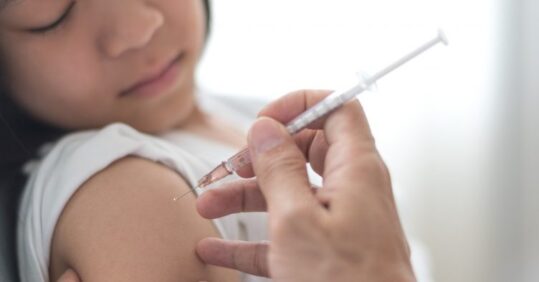The rate of uptake of childhood vaccinations around the world has fallen sharply during the Covid-19 pandemic, according to a study.
Researchers from the University of Oxford have described ‘an alarming decline’ in childhood vaccinations during 2020, with the UK seeing a 20% reduction in the uptake of measles-mumps-rubella vaccination in the first three weeks of Covid-19 restrictions.
The vaccine disruptions, reported this week on the medical preprint service medRxiv, have taken place around the world, but have had the biggest impact on disadvantaged children in the poorest countries.
Background vaccines are highly effective at preventing a range of childhood infections.
The researchers report that prior to the Covid-19 pandemic 86% of infants worldwide received three doses of diphtheria, tetanus, pertussis (DTP3) vaccines, with regular childhood immunisations preventing between two to three million annual deaths from infectious diseases.
The research was led by Professor Carl Heneghan, director of the Centre for Evidence-Based Medicine at the University of Oxford University, and involved a review of 35 studies that assessed childhood vaccination uptake during the restrictive phase of the Covid-19 pandemic. The study also looked at ten reports by national or international agencies with original data on vaccine uptake in order to understand the changes in the pattern of childhood vaccinations before and after the pandemic.
A fall in uptake of vaccines for children was seen in Africa, Asia, America and Europe, but was most significant in countries where vaccination rates were already suboptimal. In addition, the researchers found that older children were more likely to be affected, with smaller declines seen in the youngest children. In England, coverage for the MMR1 vaccine fell below the World Health Organisation (WHO) 95% target during September and December 2020.
The researchers state that ‘the true impact of Covid-19 disruptions on childhood vaccination services is yet to be determined’ and point to the disruptions in the measle vaccination programme due to the Ebola outbreak in Guinea. During 2016 to 2019, after reductions in vaccinations, worldwide measles deaths increased by 50%, with over 200,000 lives lost in 2019.
Professor Carl Heneghan told Nursing in Practice: “Covid-19 led to wide-scale disruptions to essential childhood vaccines across the globe. The falls in polio, measles and BCG vaccinations are particularly concerning given the devastating impact of the diseases they prevent.’
He added: ‘In many countries, normal rates of vaccinations resumed but it is essential that catch-up programs are also put in place to minimise the impact on children’s well-being. We must also plan for the future: to ensure that pandemic plans minimise the disruptions to essential evidence-based interventions.’







